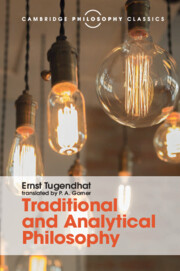Book contents
- Frontmatter
- Dedication
- Contents
- Preface
- Preface
- Translator's preface
- Part I Introduction: confrontation of analytical philosophy with traditional conceptions of philosophy
- 1 A question of method
- 2 A philosopher in search of a conception of philosophy
- 3 Ontology and semantics
- 4 Has formal semantics a fundamental question?
- 5 Consciousness and speech
- 6 The argument with the philosophy of consciousness continued
- 7 A practical conception of philosophy
- Part II A first step: analysis of the predicative sentence
- Bibliography
- Index of names
- Index of subjects
3 - Ontology and semantics
from Part I - Introduction: confrontation of analytical philosophy with traditional conceptions of philosophy
Published online by Cambridge University Press: 05 August 2016
- Frontmatter
- Dedication
- Contents
- Preface
- Preface
- Translator's preface
- Part I Introduction: confrontation of analytical philosophy with traditional conceptions of philosophy
- 1 A question of method
- 2 A philosopher in search of a conception of philosophy
- 3 Ontology and semantics
- 4 Has formal semantics a fundamental question?
- 5 Consciousness and speech
- 6 The argument with the philosophy of consciousness continued
- 7 A practical conception of philosophy
- Part II A first step: analysis of the predicative sentence
- Bibliography
- Index of names
- Index of subjects
Summary
It is at the beginning of Book IV of his Metaphysics that Aristotle first introduces his new conception of philosophy. ‘There is a science which studies being as being.’ Indeed the special character of this science vis-à-vis the other sciences is supposed to consist in the fact that whereas the latter investigate a particular sphere of being philosophy investigates being as being. What distinguishes the concept of being, for Aristotle, is that it is the most general concept. For of everything and anything one can say that it is. Everything and anything, therefore, can be called being.
Clearly Aristotle arrives at his new conception of philosophy by dropping the aspect of justification from the preliminary conception developed at the beginning and settling exclusively for the aspect of highest generality. The highest, pre-eminent science, called philosophy, is universal, but does not have a justificatory role in relation to the particular sciences. This conception, since it is orientated towards the concept of being (on), leads to the conception of philosophy as ontology.
To enable us to understand the specific character of this conception of philosophy as ontology (and this means: a conception that is based on the concept of being) we can think of an analogous reflection using a concept of modern philosophy, that of an object. Each science has to do with a specific sphere of objects, objects of a specific kind, and with a specific mode of accessibility. Can one say that it is also the task of the particular science to thematize this object-sphere as such and the peculiar mode of givenness which distinguishes it from other object-spheres? One could argue about this. Since the concepts which characterize an object-sphere as such are not of merely gradually higher generality than the concepts within the object-sphere, one can say that the object-sphere as such, e.g. that of physics, the arts, mathematics, is the subject-matter of the philosophy of physics, philosophy of art, philosophy of mathematics. Husserl called such a thematization of an object-sphere a ‘regional ontology’. What is discussed in such an ontology is what it is to be an object of the relevant sphere.
- Type
- Chapter
- Information
- Traditional and Analytical PhilosophyLectures on the Philosophy of Language, pp. 21 - 35Publisher: Cambridge University PressPrint publication year: 2016



